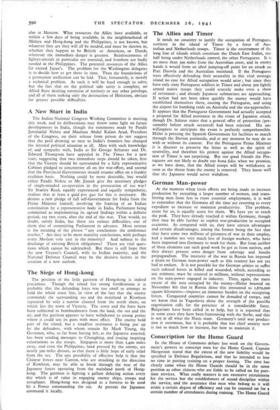A New Start in India
The Indian National Congress Working Committee is meeting this week, and its deliberations may throw some light on future developments in India, though the statements made by Pandit Jawaharlal Nehru and Maulana Abdul Kalam Azad, President of the Congress, on their release from prison do not suggest that the peril drawing so near to India's frontiers has changed the internal political situation at all. Men with such knowledge of, and sympathy with, India as Sir George Schuster and Dr. Edward Thompson have appealed in The Times for a new start, suggesting that two immediate steps should be taken, first that the Viceroy should be surrounded by a fully representative Cabinet pledged to concentrate all on the war-effort, and second that the Provincial Governments should resume office on a frankly coalition basis. Nothing could be more desirable, but would either Pandit Nehru or Mr. Jinnah give the necessary pledges of single-minded co-operation in the prosecution of the war? Sir Stanley Reed, equally experienced and equally sympathetic, realises that at least a quid pro quo for this is necessary. He desires a new pledge of full self-Government for India from the Prime Minister himself, involving the framing of an Indian constitution by a representative body in India, Parliament being committed to implementing its agreed findings within a definite period, say two years, after the end of the war. That would, no doubt, satisfy India, but there are serious difficulties, one of them that of committing Parliament in advance. More serious is the meaning of the phrase " any conclusions the conference reaches." Are they to be mere majority conclusions, with perhaps every Moslem vote cast in the minority? And subject to the discharge of existing British obligations? These are vital ques- tions which cannot be sidetracked. But there is still hope that the new Viceroy's Council, with its Indian majority, and the National Defence Council may be the decisive factors in the creation of a new outlook.






















 Previous page
Previous page